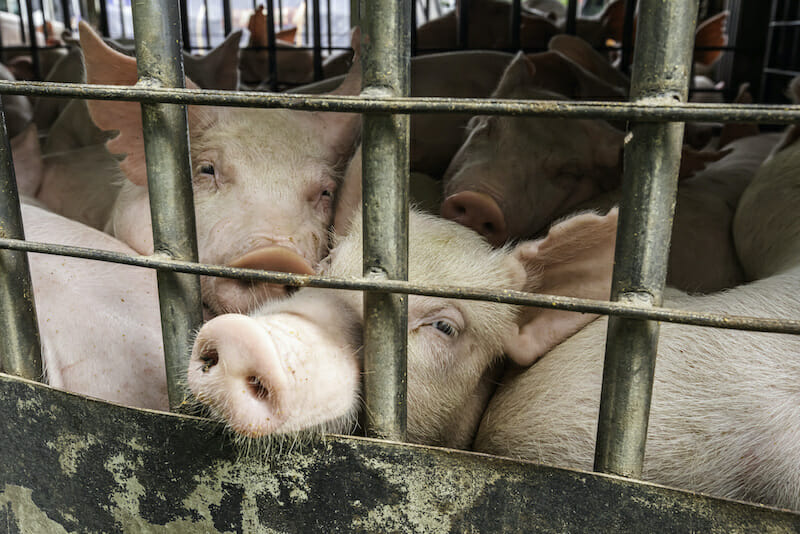Animal Ag has three new tricks up its sleeve to get conscientious consumers to buy and pay higher prices for factory-farmed meat, eggs and dairy.
The deceptions — complicit with the industry’s long history of concealing the serious suffering that animals in hellish factory farms endure — arrive at a time when plant-based eating is on the rise, with a Good Food Institute (GFI) analysis reporting that grocery sales of plant-based products has grown by 29% in the past two years.
From misleading labels classifying meat products from warehouse-like conditions as “humane” to legislative attempts to censor plant-based products and keep whistleblowers from sounding the alarm on unsanitary conditions inside slaughterhouses, here are three of the dirty tactics that Big Animal Agriculture is using to keep abusing pigs, birds, and cows for profit.
3. Plant-based “censorship” is the newest effort by Animal Ag to cut down on competition and consumer choice.
Animal Law Scholar Bianka Atlas noted a record-breaking $3.1 billion investment in alternative protein sources last year was more than triple that of any other single year.
To cut competition to the traditional meat market, more than 20 states have since passed “truth in labeling” laws that can come with hefty fines for plant-based producers, she added.
Generally, the laws require that any plant-based product labeled as “meat” also contains other qualifiers: such as vegan, veggie, plant-based, meat-free, or meatless.
While regulators tout those mandates as a way to cut consumer confusion, companies with products that clearly meet the requirements — such as Tofurky, which clearly bears “plant-based” labels in prominent locations on packaging — still have been sued in states where meat sales factor heavily in the local economies.
Mississippi is one such state, Atlas said, where Farm Bureau Federation President Mike McCormick noted the labeling laws would “protect our cattle farmers from having to compete with products not harvested from an animal.”
2. Companies using “humane” or “natural” labels aren’t necessarily treating their animals well.
Studies have shown that people will pay more for animal-derived products if they think the animals lived humane lives.
That market research has led to an appalling trend called “humane washing,” where companies slap “humane” or “local farm” labels or images of animals grazing in sunny, grassy fields onto their products, despite animals often living in the cruel and ghastly conditions of industrialized factory farms.
- Per the United States Department of Agriculture (USDA) definition, the label “natural” applies to processing meat after animals are slaughtered.
- The USDA doesn’t define what “humanely raised” means, leaving it up to producers to come up with their own definitions
“Although many businesses are implementing humane practices, others are trying to mislead their consumers and make larger profits,” confirmed Dasha Nikitina, an animal law scholar at Vermont Law School.
Numerous misleading labels — aimed solely at increasing profit based on consumer perception, rather than actually affording protections for animals — have come under fire in the country’s court systems, including those used by Boar’s Head, Tillamook County Creamery Association, Fairlife LLC, and Ben and Jerry’s.
1. “Ag-Gag” laws aim to protect companies, not consumers.
The term “Ag-Gag law” refers to any piece of legislation that attempts to silence or punish whistleblowers for revealing unsanitary or inhumane conditions inside animal agriculture facilities. Some examples are state codes that criminalize audio or video recording inside of slaughterhouses and state laws that convict undercover investigators of agricultural production facility fraud if they gain access to a facility under false pretenses.
The Animal Legal Defense Fund (ALDF), one of the premiere nonprofits that tackles unconstitutional ag-gag laws and misleading labels nationwide, notes the public has the right to be informed about what’s really happening in these facilities for numerous reasons.
“The ability to investigate, document, and publicize corporate agriculture’s abuses is imperative both to the well-being of animals across the nation—and to our own health and safety,” the nonprofit wrote on its website.
The courts also have come to that realization. Ag-gag laws have been struck down as unconstitutional in more than 20 states and were otherwise defeated in more than a dozen other states, according to ALDF.
But the most important thing to know is that you can be part of the solution for animals, people, and our planet.
- Go plant-based! There’s no other single action you can take to make as big of a positive impact for animals, the environment, and the planet as transitioning to a completely plant-based lifestyle.
- Join any class action suits that might be relevant to you as a consumer if you feel that you have purchased an animal-derived product with a misleading label about the animal welfare standards involved.
- Tell your legislators that you want stronger protections for farmed animals to be enacted and enforced. Also stay informed and speak out against any Ag-gag laws that might sprout up in your state or community.

